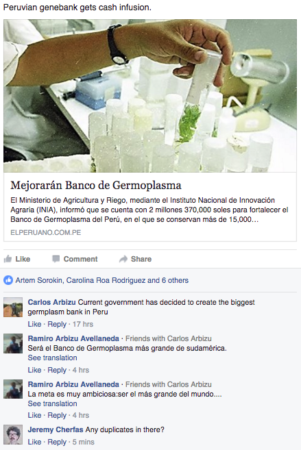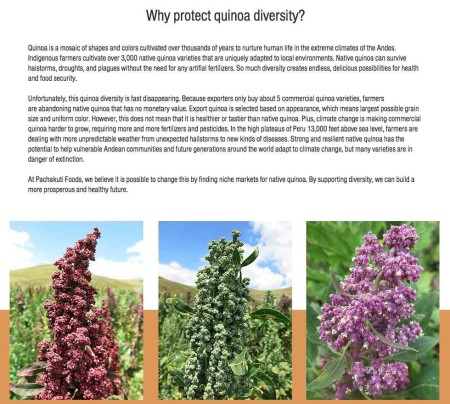Peruvian genebank to get bigger, but how much?
There’s much excitement over on my Facebook page about the announcement of a cash infusion for the Peruvian genebank.

I’ll be here, holding my breath.
Nibbles: Bush tucker, Amazonian tea, Bolivian genebank, Global diets, Heirloom wheat, Clam gardens
- Aussie native vegetables on the menu. No Latin names, but Rhizowen Radix tell me: youlk = Platysace deflexa; kulyu = Ipomoea calobra.
- Another non-scientifically named plant is set to save the Amazon. Turns out it’s Ilex guayusa. Probably.
- World Bank to build genebank in Bolivia.
- World Coffee Research puts out nice variety catalogue.
- Our paper of a couple of years ago on globalized diets makes it to Scientific American and gets mashed up with the latest one.
- Purple patch for Purple Straw?
- Yes, you can garden clams.
Nibbles: Vavilov double, Huge avocado, African urban ag, Agarwood threat, Double coffee, Sequencing beer, Sloane ranges, Chinese bees, Gendered breeding, Access to seeds/meds, Genebank funding, Quinoa prices, Organic ganja
- VIR on Atlas Obscura, with pic goodness courtesy of yours truly. And on the same site, something Vavilov would have approved of: a very diverse Tajik apple orchard.
- A new avocado to conjure by.
- Urban agriculture won’t cut the mustard.
- Trees that named Fragrant Harbour disappearing.
- The downside of coffee. But never fear, there’s a strategy coming!
- The beernome!
- Happy birthday Sir Hans Sloane, for many botanical reasons!
- Chinese pollinators in trouble. Enough of the exclamation marks.
- Do you have any examples of “plant or animal breeding that has successfully incorporated gender considerations into its strategies and end products”? Contact these people.
- Can seeds learn from meds, policy-wise?
- Bioversity DG lobbies for genebanks.
- Get your fill of quinoa, courtesy of Jeremy.
- Sustainable pot. ‘Cause that’s the California Way, man.
Milking quinoa for livelihoods
We’ve been contacted by Alexander Wankel of Pachakuti Foods with news of an intriguing Kickstarter campaign. Pachakuti is…
…a social enterprise committed to sourcing rare Andean superfoods directly from farmers to create unique products for a healthier life and a better world. By finding markets for underutilized crops, we strive to support biodiversity while providing a fair income for Andean farmers.
The unique product that is the focus of the Kickstarter is, of all things, quinoa milk.
Pachakuti Foods is launching the first quinoa milk made with carefully selected native quinoa varieties that have a naturally milky flavor and texture. Made from some of the yummiest quinoa in Peru, our quinoa milk is richer and creamier than quinoa milk made from conventional quinoa that is currently on the market. It is 100% vegan, gluten free, and contains high quality proteins with all the essential amino acids that the body needs.
They’re about half-way to their goal, which is $15,000.
This Kickstarter campaign is our first opportunity to hit the ground running, both by helping us raise money as well as tell the story of why quinoa diversity is important.

So help them out, if you’re so inclined. Or maybe point them to a bank that might be interested in giving them a business loan.